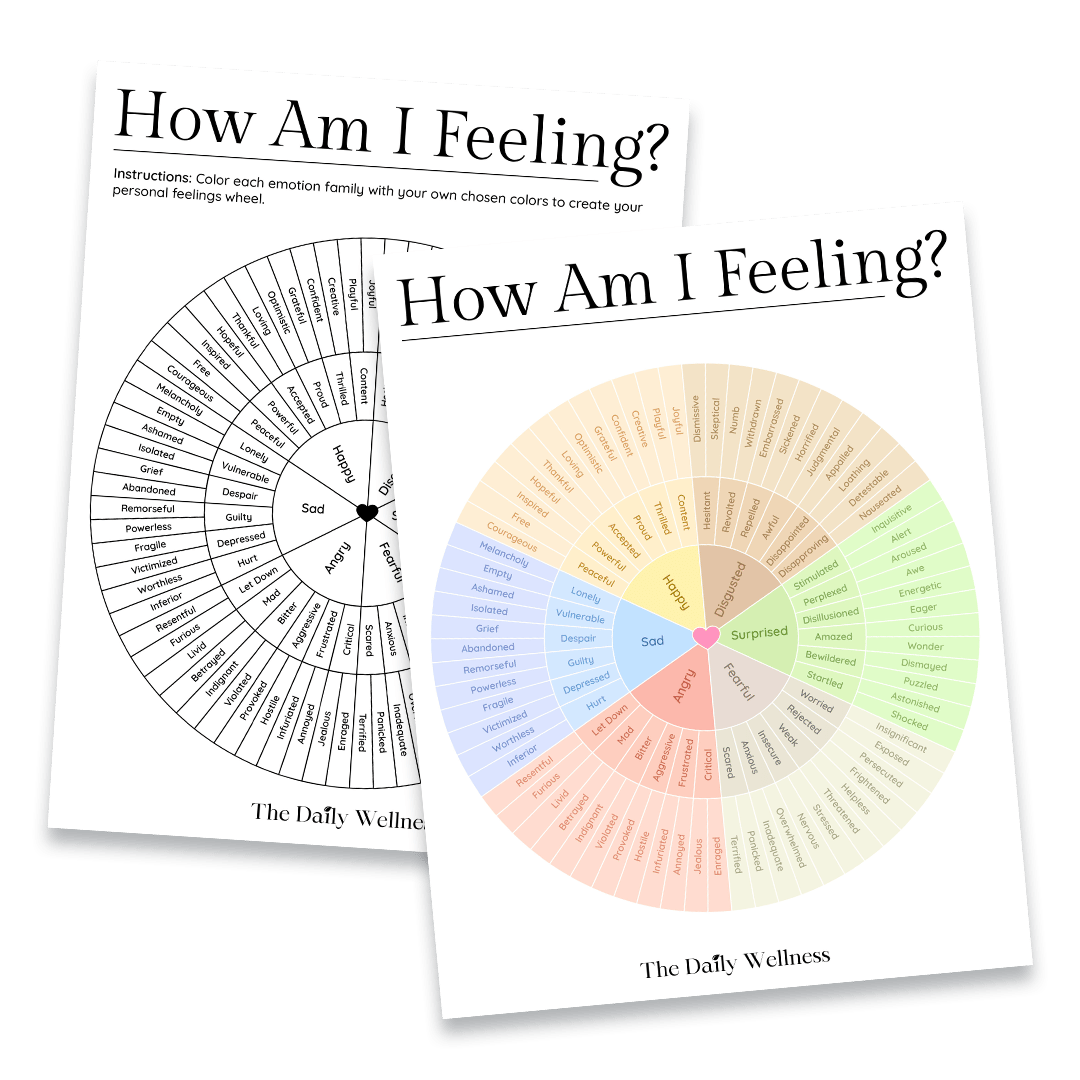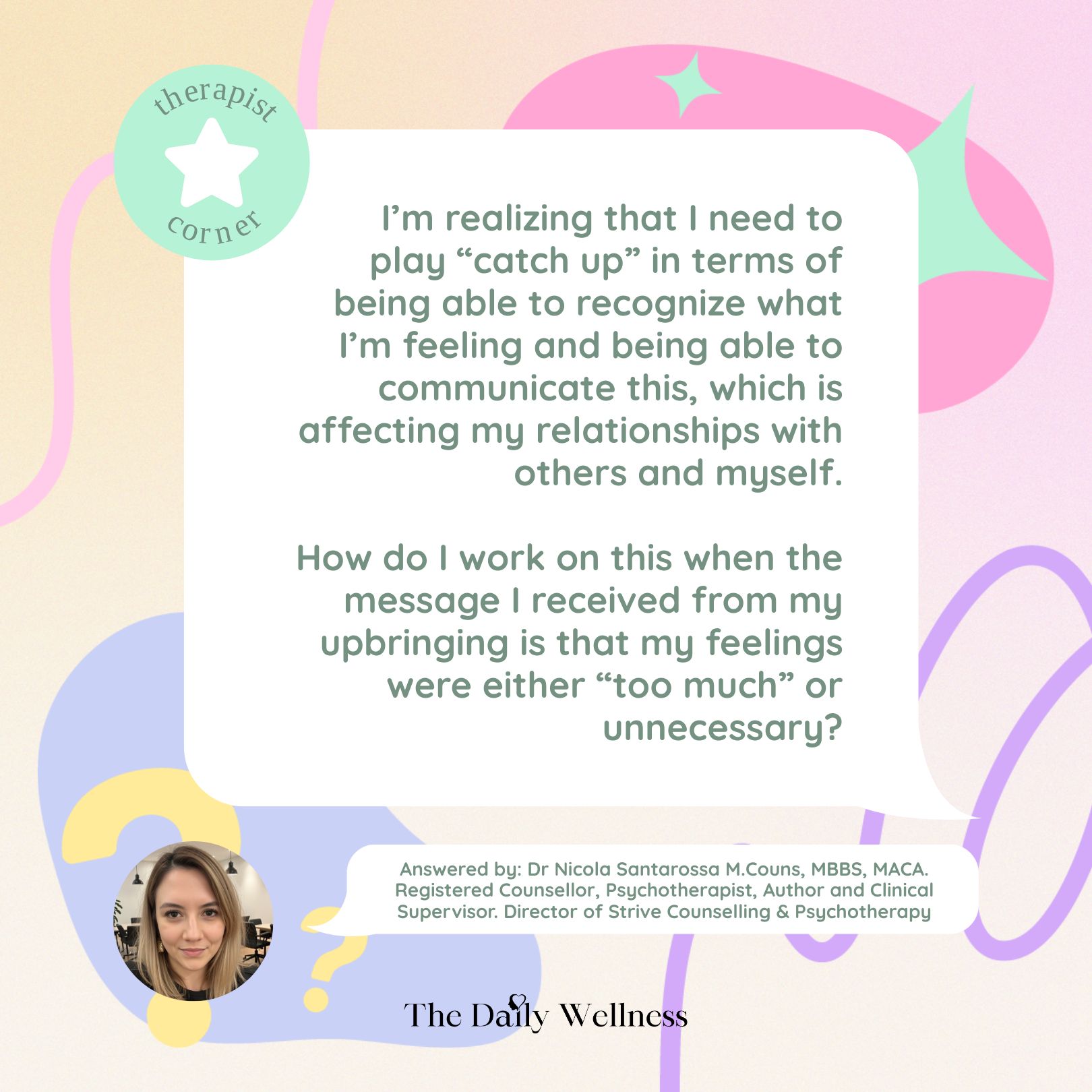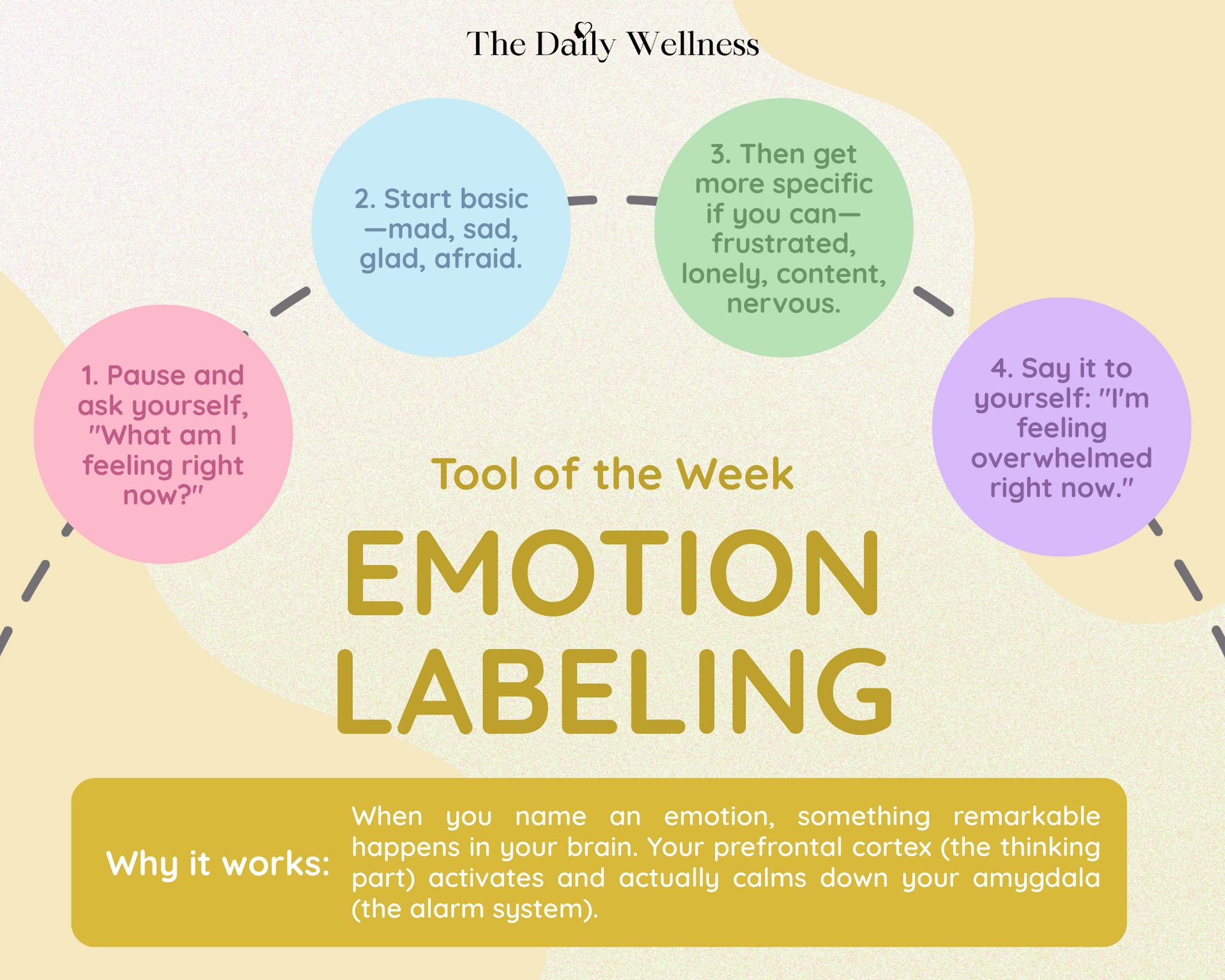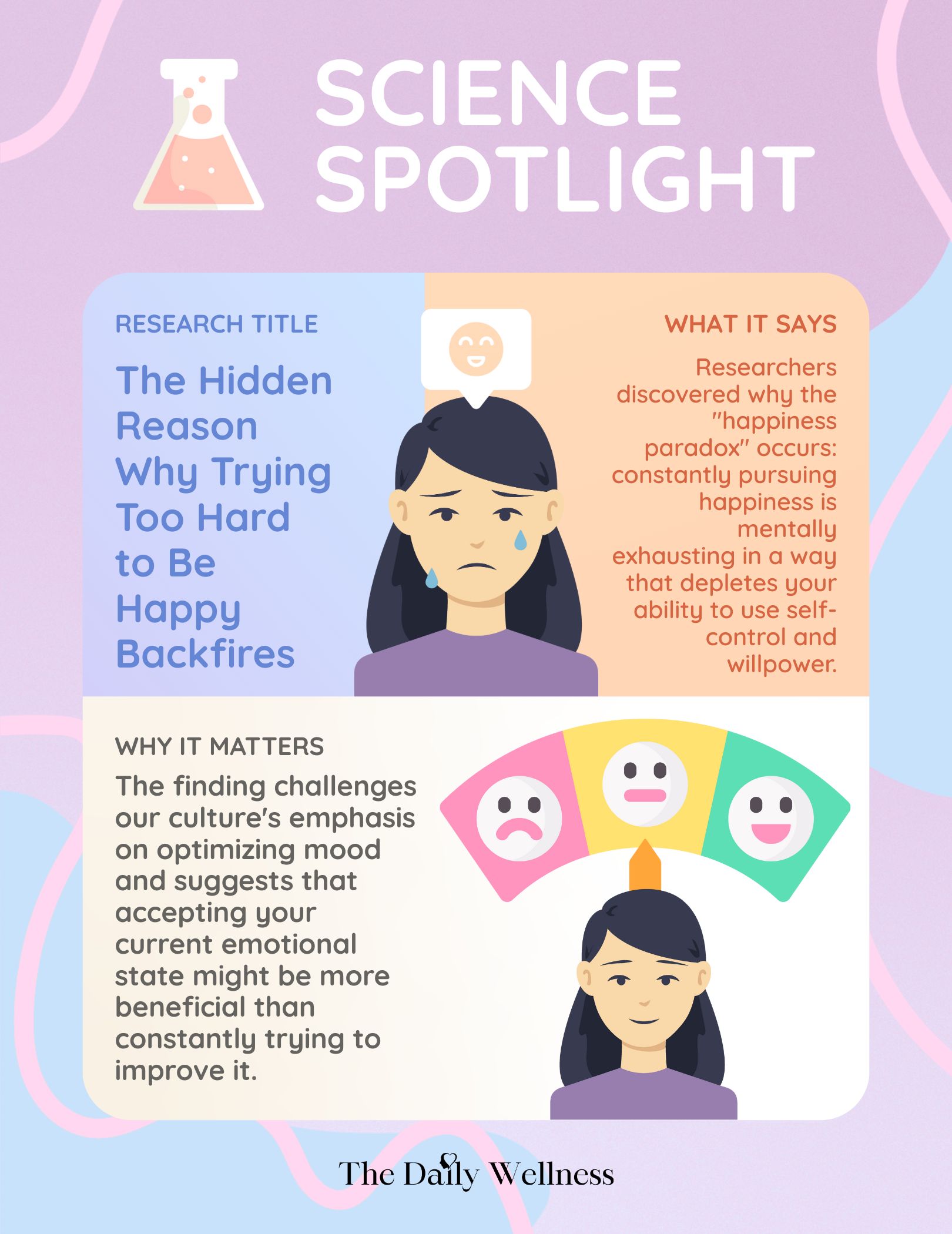Thanks to your recent votes, we've updated The Daily Wellness logo! The new look reflects your feedback, and we’re grateful you helped shape it.
In this edition: a one-minute emotion-labeling reset with a printable emotion wheel, a therapist’s guide to building emotional literacy, and why chasing happiness can drain willpower, plus a quick news round-up.
Today’s Quick Overview:
🔬Science Spotlight: The hidden reason why trying too hard to be happy backfires…
🛠️ Tool of The Week: Emotion labeling: the simple practice of putting words to what you're feeling...
📰 Mental Health News: Extreme heat at work, offline hobbies to curb doomscrolling, and guidance for anxious teens....
🙏 Therapist Corner: How childhood emotional patterns resurface in adulthood...

Let's see what color your inner world is painting today:
What color is your Monday morning? Soft gray of just waking, bright yellow of new possibility, or deep blue that asks you to ease in. Let your color guide how you meet this day.
QUICK POLL
Choose the closest match, and we’ll tailor a small shift that makes the week feel lighter.
Which Best Describes Your Monday Start?
If today feels good, we’ll help you keep it. If it’s a little off, we’ll help you nudge it 5%.
MENTAL HEALTH GIFT
Feelings Wheel

To support today’s practice, we’ve created a printable feelings wheel. One version is colorful and detailed; the other is blank so you can color it yourself, building a personal map of emotions. Reply to this email with today’s date: September 1, 2025, and we’ll send the file within 24 hours.
Expanding your emotional vocabulary makes the “name it to tame it” technique much easier. Instead of saying “bad” or “fine,” you’ll have words like “restless,” “excluded,” or “grateful” at hand. Those distinctions matter for emotional clarity and for communicating with others.
THERAPIST CORNER

Answered by: Dr. Nicola Santarossa M.Couns, MBBS, MACA — Registered Counsellor, Psychotherapist, Clinical Supervisor; Director, Strive Counselling & Psychotherapy
Childhood Emotional Patterns: Resurfacing in Adulthood.
This is a very common question highlighted by a recent poll that 44.5% of readers felt that their emotions were often “swept under the rug,” meaning they were either ignored, minimized, or dismissed with phrases such as 'just get over it', ‘you’re being too sensitive’, or 'it's not that bad’.
The truth is, we all learn different skills at different time intervals and no one’s upbringing was perfect.
For the majority of you, this gap has arisen from our parent(s) lack of knowledge or simply a “blind spot” on the topic, but for a small majority of you, this may just be a symptom of a much larger problem relating to emotional abuse or neglect.
If this is the case, it would be worth seeing a mental health professional to help you make sense of some of the experiences you had growing up.
I’d like to be very clear - your emotions are always valid. The way you choose to express these, however, is where we can sometimes run into trouble. Some ways you can work on this are:
Learning to simply allow and make space for your emotions
Cultivating your tolerance for emotional distress
Practicing responding without reacting and
“Name it to tame it” is a phrase used in Neurolinguistic Programming (a fancy term for attributing language to emotions) when discussing emotional intelligence.
How it works:
Notice the emotion: Become aware of the strong emotional or physical sensation you are experiencing
Name the emotion: Describe the feeling using words, such as “irritated”, “overwhelmed”, “ashamed”, or “excluded”.
Connect your brain: This process connects the logical left side of your brain with the emotional right side
Regulate the emotion: By attributing language to an emotion, it activates the prefrontal cortex (the thinking centre), which transfers brain activity from the amygdala (the emotional centre).
This process helps reduce the intensity of emotions, gain control, and enables you to respond with more clarity and less reactivity, fostering emotional regulation over time.
The good news is that emotional intelligence is a skill you can work on at any age, which can lead to increased self-awareness, stronger relationships, and greater success with achieving your personal and career goals. These skills can be learned, developed, and improved by conscious efforts such as:
Self-reflection
Mindfulness
Activities such as the one below
Feeling creative? Try printing out the Feelings Wheel tool in today’s Mental Health Gift, get yourself some coloured pencils/markers/paints, and when you notice you are feeling something you are unsure of, refer to this emotions wheel and colour in the one that best explains your current state:
The bottom line is - no one’s childhood was perfect. It’s very common that as adults we begin to realize we may have missed out on critical lessons others appear at times to take for granted, and that change is always possible, no matter any age, stage, or circumstance.
About Dr. Santarossa
Dr Nicola Santarossa is a Registered Counsellor and Psychotherapist with a background in Medicine. She specializes in working with individuals with unresolved childhood trauma and the consequences of this in adulthood (including but not limited to) mood disorders such as bipolar and major depression, ADHD, substance misuse, disordered eating and managing complex medical conditions including chronic pain.
Website: strivecounselling.com.au
Psychology Today: Profile link
TOOL OF THE WEEK
Emotion Labeling

What it is: The simple practice of putting words to what you're feeling in the moment. Instead of pushing a feeling away, you name it: “I feel anxious,” “I feel disappointed,” “I feel relieved.” You are being a friendly narrator to your inner life, without judging or fixing.
How to practice it: Pause and ask, “What am I feeling right now?” Start broad: mad, sad, glad, afraid. Then, if it fits, get a touch more specific: frustrated, lonely, content, nervous. Say it quietly: “I’m feeling overwhelmed right now.” Notice if one notch of space opens between you and the feeling. That’s the win. That space is where choice lives.
Why it works: Naming a feeling often lowers the intensity just enough to think more clearly. That small bit of space is where choice lives: do I pause, ask for what I need, take a walk, send a text, or table this for later?
If you grew up with your feelings minimized, this practice is a gentle way to rebuild comfort with your inner signals and expand your emotional vocabulary.
When it’s most useful:
When you feel swept up and are not sure why.
Before replying when you feel triggered.
During work stress that makes everything feel “too much.”
When your body is tense, but you can’t quite name what’s wrong.
In therapy or journaling to deepen awareness.
If naming is hard: Begin with your body. Tight chest, clenched jaw, fluttery stomach. Work backward: “Tight chest often means anxiety for me.” An emotions wheel on your phone can help. You can also hold more than one feeling at once: “I’m grateful and anxious.” Both can be true.
SCIENCE SPOTLIGHT
The Hidden Reason Why Trying Too Hard to Be Happy Backfires: It Drains Your Willpower

Research finding: Researchers ran several studies with hundreds of participants. People nudged to “pursue happiness” were more likely to choose short-term comforts (like eating more chocolates in a taste test) and to stop difficult mental tasks sooner than those who simply followed their preferences.
Those who habitually chase happiness also reported less day-to-day self-control. The pattern suggests that active mood management can tax the limited mental resources we rely on for follow-through.
What this doesn’t mean: It doesn’t mean you should ignore your feelings or never seek joy. It means you can give yourself permission to feel how you feel and take one small step that supports your well-being, often a kinder route to contentment than chasing it.
Try it today: Let your mood be what it is for a moment. Name it (“a little flat,” “wired,” “heavy”). Then choose one simple action that tends to help you: step outside for two minutes, send a kind text, put your phone in another room for ten, set a lights-out time. You’re not forcing happiness; you’re creating conditions where steadiness can happen.
MENTAL HEALTH NEWS
WHO–WMO warn extreme heat is a growing worker health risk, including mental strain. New joint guidance urges governments/employers to protect workers from heat stress, linking rising temperatures to physical harms and poorer mental health and productivity.
Anti-doomscrolling hobbies as anxiety reset. A Glamour first-person piece shows how hobbies like knitting or journaling can interrupt “popcorn brain” and reset attention.
Anxious teens need guidance, not the cotton-wool treatment. Citing a More in Common poll finds that teens report anxiety, with many missing school as a result. Experts caution against over-medicalizing normal stress, calling instead for guidance and support.
DAILY PRACTICE
Today’s Visualization Journey: School Supply Shopping at the Old Five-and-Dime

Walk the narrow aisles of a small five-and-dime, past glass cases of notebooks, pencils, and sturdy erasers. The wooden floor creaks softly. The air smells like paper and possibility.
At the counter, the shopkeeper knows where everything lives and wraps each item in brown paper. “There’s something about fresh supplies,” she says. “Blank pages and new pencils can make starting feel easier.”
You leave with crisp folders and unsharpened pencils, feeling that tidy sense of readiness: tools gathered, mind clear, a gentle nudge to begin.
Make It Yours: What blank page in your life is ready for fresh ideas this week? How can you approach Monday with the same excitement as someone opening a new notebook for the first time?
Today’s Affirmations
"I can embrace new beginnings without discarding everything I've learned."
Mondays carry the feel of fresh starts. Beginning again doesn’t mean erasing what came before. Your hard-won lessons, relationships, and growth can travel with you into what’s next.
Try this: Before you start a new routine or goal, name two insights you want to carry forward and one habit you’re ready to retire. Let those guide how you begin.
Gratitude Spotlight
Today's Invitation: "What's one thing you've learned to say 'no' to recently that used to drain your energy?"
Why It Matters: Saying no protects the time and attention you need for what matters. Boundaries are not selfish. They make it possible to show up fully where you choose.
Try This: When a draining request appears, pause and remember a recent boundary you set. Say, “I can choose what deserves my energy,” and give yourself credit for honoring it.
WISDOM & CONTEXT
"Life shrinks or expands according to one's courage." — Anaïs Nin
Why it matters today: Small choices toward comfort or courage shape the feel of your days. Courage does not have to be grand. It often looks like one honest sentence or one first step.
Bring it into your day: Pick one place you’ve been choosing the smaller option. Name the moment out loud, “I’m choosing courage here.”, and make a single move that widens the boundary.
WEEKLY JOURNAL THEME
Your 3-Minute Writing Invitation: "What's one fresh start I'm craving right now, and what's the smallest way I could begin that renewal today?"
Why Today's Prompt Matters: Mondays have a quiet pull toward beginning again. You do not need perfect conditions. Naming the renewal you want helps you notice one friendly doorway into it.
WEEKLY CHALLENGE
The "Choose the Hard Conversation" Challenge
If there is a talk you have been skirting because it feels awkward, pick one clear piece of it and reach out this week. Keep it current rather than reopening everything at once.
You might start with, “I’ve been thinking about something and want to check in,” or, “When [specific moment] happened, I felt [feeling]. Can we talk about it?” Feeling a little uncomfortable does not mean you are doing it wrong. It means you are being real.
A small step: Send a simple text to open the door and set a time to talk.
TODAY'S PERMISSION SLIP
Permission to Start Your Month Without Big Goals or Resolutions
You're allowed to begin a new month without setting ambitious targets, creating detailed plans, or feeling pressure to use this fresh start as motivation for major life changes.
Why it matters: New months can trigger the same productivity pressure as New Years, making us feel like we should always be optimizing, improving, or working toward something bigger.
But sometimes the most nourishing thing you can do is simply continue living your life without the added weight of monthly goal-setting or self-improvement projects.

Tonight's Gentle Review
Invite the day to exhale by asking yourself:
What did I notice about my energy as September began today?
Where did I choose to embrace a fresh start instead of carrying old patterns forward?
What's one thing I did today that felt aligned with who I'm becoming?
Release Ritual: Open a window or step outside. Feel the air on your skin. Take three slow breaths. With each exhale, let some pressure from unfinished plans leave your body. Then tell yourself, “Today was enough.”
QUESTION OF THE DAY
"What would it feel like to approach this new month as a chance to surprise myself?"
A new month often brings pressure to get back on track or return to old routines after being distracted over the past weeks.
This question invites you to consider this month as an opportunity to discover new things about your preferences, capabilities, or what brings you joy.
Hit reply and tell us: what did you release, and how did it feel? We feature a few anonymous responses in future editions, so keep an eye out. You might just see your words helping someone else breathe easier.
WANT TO CONTRIBUTE TO OUR NEWSLETTER?
Are you a therapist, psychologist, or mental health professional with something meaningful to share?
We're opening up space in our newsletter for expert voices from the field — and we'd love to hear from you.
Whether it’s a personal insight, a professional perspective, or a practical tip for everyday mental health, your voice could make a difference to thousands of readers.
👉 Click here to apply to contribute — it only takes 2 minutes.
TUESDAY’S PREVIEW
Coming Tuesday: What to say when your family keeps asking about your job search and every conversation turns into an interrogation that adds stress to an already stressful situation.
MEET THE TEAM
Love what you read? Share this newsletter with someone who might benefit. Your recommendation helps our community grow.
*The Daily Wellness shares educational content only and is not a substitute for professional medical or mental health advice and diagnosis. Please consult a licensed provider for personalized care.